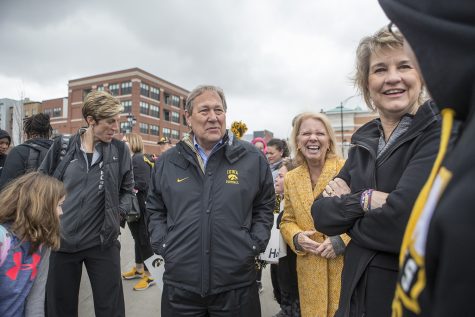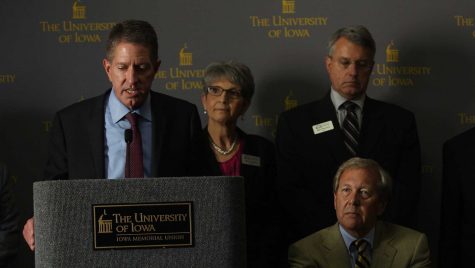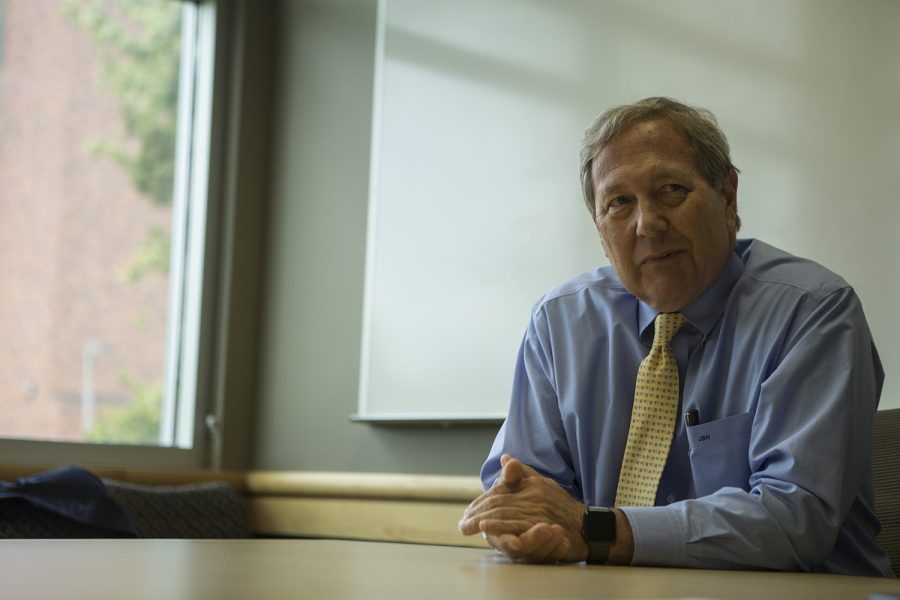Bruce Harreld wants to be UI president after contract expires
UI President Bruce Harreld’s contract extends through November 2020, but he told the DI he would continue to be UI president if things go his way. It’s up to the state Board of Regents to determine his Hawkeye future.
University of Iowa President Bruce Harreld sits down for an interview with the Daily Iowan in the Adler Journalism Building on May 2, 2019.
The University of Iowa community may keep current President Bruce Harreld beyond the five years stipulated in his contract — if Harreld has his way and the state Board of Regents asks him to continue serving.
In a May 2 interview with The Daily Iowan, Harreld said “yes,” he would like to continue being UI president after 2020.
“Of course, and I love it,” he said. “… I think my wife and I love that charm and love that energy, love that passion, and you know I think you all know I love students, I love being around them. I’d rather be with students than anything else all day long, so yeah, that certainly wouldn’t be the issue.”
RELATED: University of Iowa history, told through the head Hawks’ eyes
He noted there are issues he faces on the job that he doesn’t enjoy dealing with as much — the ongoing legal disputes with Cedar Rapids construction company Modern Piping, for example — but overall, he said the charm of the UI and Iowa City is that people actively engage with the surrounding world and force a conversation about issues.
“I think the agenda is exciting, but it’s up to the Board of Regents to decide who should lead, and I need to get comfortable to figure out that I am the right person, as well,” he said.

The regents offered Harreld a five-year contract, starting Nov. 2, 2015, when he was selected as the 21st UI president in September 2015. Harreld’s salary has not been bumped beyond his initial base pay of $590,000 with a $200,000 annual deferred compensation package to be paid out after five years.
Harreld’s response to the DI is a change in tune from previous answers he has given to inquiries about how long he plans to stick around the UI. He told the Gazette earlier this year simply, “Five-year contract” when asked about whether he would stay beyond his initial five-year agreement, Gazette reporter Vanessa Miller wrote on Twitter.
As Harreld indicated, it is up to the regents to hire presidents, extend their contracts, or increase their pay.
“Each presidential contract, including length of time and compensation, is unique,” regent spokesman Josh Lehman wrote in an email to The Daily Iowan. “The board does annual evaluations in June of each university president in closed session. If there is a change in a president’s compensation, or an extension of a contract, it would be voted on by the board in open session at a meeting.”
But one question loomed over Harreld’s head as he pondered his future as a Hawkeye: “… What needs to get done ahead — do I have the mandate to get it done from the board and other constituencies on campus?”
Controversy clouded Harreld’s hiring given his background as a businessman leading companies such as Kraft Foods, IBM, and Boston Market. The other three finalists had experience in higher-education administration, leading to doubts about Harreld’s qualifications.
On top of that uncertainty, reports emerged around the time of Harreld’s hiring that several regents met with him privately in a manner that circumvented Iowa open-meetings law — an opportunity they afforded no other candidate. That chain of events prompted lawsuits against the regents and 2015 presidential-search committee, alleging violations of state open-meetings and open-records laws.

Former state Board of Regents President Bruce Rastetter announces the appointment of Bruce Harreld as the new UI president during a meeting in the IMU on Sept. 3, 2015. Harreld is the 21st president of the UI.
A judge ruled on the former lawsuit in the regents’ favor, determining there was no violation of open-meetings law. The latter was settled with the UI admitting no wrongdoing.
For Harreld to continue leading the university on issues such as advancing diversity, equity, and inclusion, as well as pushing the state for more funding, he said, the “hooting and hollering” of his first year on campus — the fallout of his hiring — need to factor in.
RELATED: Harreld’s first day
“… Is that over? Or is that still an undercurrent? Because if that’s the case, fine, let someone else come in and take us to the next level. I’m fine with that,” he said. “… So I just go back to that period, and I just wonder, have we healed and moved on? If I don’t think we have, it might not be productive to have me continue to lead on a number of really sensitive issues …”



